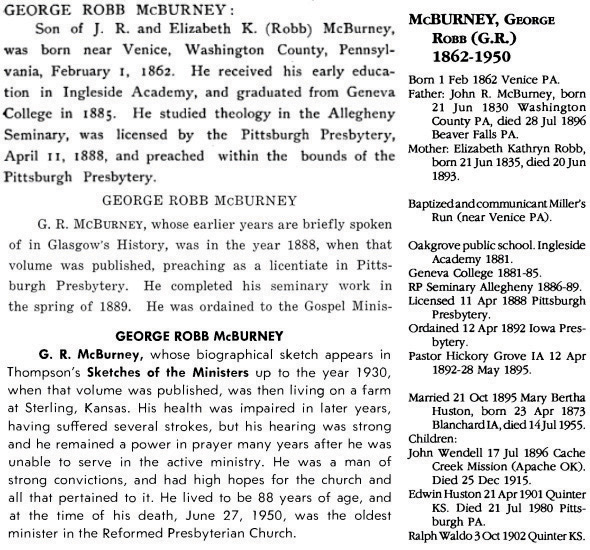You have free articles remaining this month.
Subscribe to the RP Witness for full access to new articles and the complete archives.
Four separate books have been published with biographical sketches of RPCNA ministers. Let’s take a brief look at each of them.
W. M. Glasgow, pastor of the Baltimore, Md., RPC, published A History of the Reformed Presbyterian Church in America in 1888. It sought to be a comprehensive history of the Reformed Presbyterian Church, comprising a brief account of the denomination’s origins, a longer discussion of the North American synod, histories of all congregations, short biographies of all ministers and licentiates, and a brief account of the church’s missions and institutions.
Owen Thompson, pastor of the Blanchard, Iowa, RPC, published Sketches of the Ministers in 1930. Short accounts of missions and lists of information occupied about 15 percent of the book, which was otherwise restricted to biographies similar to Glasgow’s. When a minister appeared in Glasgow, Thompson limited the sketch to the minister’s activity since 1888.
Alvin Smith, pastor of the Union (Mars, Pa.) RPC, published Covenanter Ministers in 1964. His book was extremely similar to Thompson’s. The sole significant difference was that ministers who left the denomination were relegated to an appendix.
Charles McBurney published Reformed Presbyterian Ministers in 1994. His book was radically different from its predecessors. Instead of presenting a prose sketch of each minister’s life (or life since the previous book), McBurney gave a large quantity of raw data; and instead of picking up at the conclusion of the previous book, his book provided lifelong data for all ministers who had served since 1950.
Each book provided slightly different kinds of information in its biographies, but in general all four books provided the minister’s birth and death dates, slight information about his family members, his childhood and education, his pastoral and non-pastoral ministerial service, his non-ministerial employment, his publications (if any), and anecdotes and other information of interest.
Although Glasgow and Thompson were 42 years apart, the other pairs of books have been about 30 years apart. Now nearly 30 years have passed since McBurney’s book. More than 150 ministers have been ordained or received by the RPCNA since then, some of whom weren’t even born in 1993. In his foreword, McBurney writes: “For years Beth and I found ourselves dusting off our copies of Glasgow and Sketches and Ministers to settle arguments about who was pastor when and where, or just to get some facts we’d forgotten or never knew. We kept wondering who would be assigned the task of adding post-1963 preachers and updating data on the others. Who had the time?” Now that there are another 30 years of ministers, what is to be done?
This year, Synod took a step toward creating the next book of minister biographies. The new book will include anyone who has served as an RPCNA minister since 1993. All ministers of the church are urged to contribute information about themselves for the new book, along with ministers who have gone to different denominations and relatives and friends of deceased ministers. The new book will mix features of the two previous books: like Smith, the book will comprise narrative sketches, but like McBurney, each minister’s whole life story will be given, not merely his life story since the previous book.
Moreover, a few ministers were missing from all of the previous books, and the new book will include a brief sketch of each of them. Several served on foreign mission fields—including Haratune Sarkissian and Apostole Egyptiades, who appeared in this column several months ago—while most of the others were Reformed Presbyterian ministers for only a short while. The most prominent missing minister is Lawrence Bottoms, who served at Selma, Ala., RPC before joining the Presbyterian Church and later served as the moderator of its General Assembly.
Who will complete this book, and when will it be completed? At this stage, your columnist is writing this book, and he hopes to be finished within a few years. He and his family are preparing to move to the Reformed Presbyterian Church of Australia, so the initial writing may be slow, and he hopes that someone else can complete it if he cannot. (This would not be unprecedented; the third book was authorized seven years before it was completed, and Alvin Smith was not the author Synod first appointed.) However, today’s telecommunications will make completion much simpler than in the pre-internet era.
Are you a minister who hasn’t completed, or hasn’t yet received, your questionnaire? Was a deceased minister a relative or friend of yours? Do you know a minister who has joined a different denomination? Your columnist would appreciate your assistance; he can be reached at njpockras@liberty.edu. Thank you for contributing a small part to the history of our denomination.
